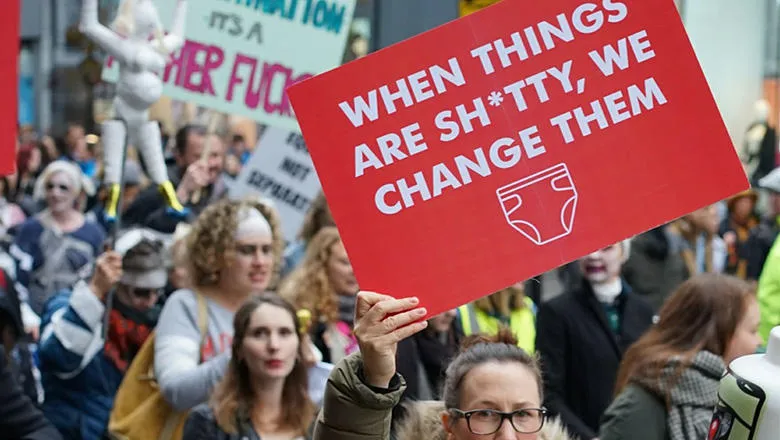“Many mothers are grafting their backsides off just to pay someone else to look after their children, and that’s if you can get a childcare place”
Joeli Brearley, Founder of Pregnant Then Screwed
15 February 2023
Mothers are overdue a revolution of their own
Joeli Brearley
Ending the motherhood penalty is not easy. No country is immune to this problem, but other countries are doing far better than the UK


Joeli Brearley is an Author and Founder of Pregnant Then Screwed.
This essay is taken from our new edition of Essays on Equality: The politics of childcare. Read the full collection here and watch our online event, Childcare in crisis: how do we fix a broken system?
“I wish I had known five years ago, as a young, childless manager, that mothers are the people you need on your team,” said Katharine Zaleski, an ex-manager at HuffPost, in an apology letter she penned for Fortune magazine. “I secretly rolled my eyes at a mother who couldn’t make it to last-minute drinks with me and my team,” she wrote, adding, “I didn’t disagree when another female editor said we should hurry up and fire another woman before she ‘got pregnant’.”
Then Zaleski had her own child and realised she had been perpetuating a workplace culture that revolves “around how men bond” and she had failed to recognise the unique strengths of working mothers. “For mothers in the workplace, it’s death by a thousand cuts – and sometimes it’s other women holding the knives.”
In 2016, the Equality and Human Rights Commission released the most robust and comprehensive research report into pregnancy and maternity discrimination that has ever been produced. It found that more than three quarters of mothers experience some form of discrimination in the workplace, and 54,000 women a year are pushed out of their job for daring to procreate. That’s a woman every 10 minutes in the UK. One in nine pregnant women lose their job for getting pregnant. The report made a number of sensible recommendations for change. Six years later, not a single one has been implemented.
Pregnancy and maternity discrimination is one of the many reasons women are poorer than men. We’ve all heard of the gender pay gap, but the term itself is somewhat misleading. Yes, there is a difference in pay between men and women, but it isn’t all about gender – because the pay gap between mothers and women without children is wider than the pay gap between men and women without children. This procreation pay gap is what sociologists refer to as “the motherhood penalty”. Mothers don’t want to be paid less than men or their childless counterparts, yet research from the Institute for Fiscal Studies found that by the time a woman’s first child is 12 years old her hourly pay rate is, on average, 33 per cent behind a man’s.
Men get pay rises and promotions when they have kids – the TUC estimates that a full-time working dad is paid 21 per cent more than childless men – while women get pay cuts and demotions when they become a mother. Some would argue that this is because mothers tend to do less paid work than women without children, and that’s certainly true, but that doesn’t tell the full story.
In addition to the negative maternal bias that many employers hold, mothers also encounter a variety of structural challenges when trying to have children and a career, including an unaffordable, inaccessible, dysfunctional childcare system. The UK has the most expensive childcare in the developed world. Two-thirds of parents pay the same or more for their childcare as their housing. This means that many mothers are grafting their backsides off just to pay someone else to look after their children, and that’s if you can get a childcare place. We lost 4,000 nurseries last year due to financial pressures on their business and an inability to recruit staff – who are nearly all women – because they are paid more for working in a supermarket or McDonald’s than they are as early years educators. Flipping burgers is valued more than educating and caring for our precious little humans.
This lack of investment in anything that involves caring is an extension of the fact that we just expect women to do it for free, alongside the cleaning and cooking. Data from the Office for National Statistics shows that women do 60 per cent more of the unpaid labour, and this was painfully apparent during the various Covid-19 lockdowns as mothers risked their career and their sanity to prop up society, ensuring the world kept spinning and society didn’t collapse into barbarian-like squalor. All of this work – the society-saving stuff – isn’t paid, and apparently has no value to society as it isn’t recognised in GDP.
I’m not saying that men are lazy, feckless, layabouts. Men and women tend to work the same number of hours; it’s just that a larger portion of women’s work is unpaid. It’s also not the case that women are the more natural caregivers, while men are only useful for beating their chest and dragging home the bacon. Men are socially, behaviourally and psychologically primed to parent. The problem is our parental leave benefit encourages women to take long periods out of the workforce, while pushing men back to the office at breakneck speed, as if they are surplus to requirements.
We all fall in line. The mother becomes the primary caregiver; the father, the primary breadwinner. As a result, 38 per cent of women work part-time so that they can cope with all of the other unpaid work they have to do. But part-time work is paid, on average, £5 less per hour than full-time work, and working part-time reduces your chances of being promoted by more than half. If you find yourself looking for work, the likelihood is you will end up in a job that is well below your pay and skill level, as only 10 per cent of jobs were advertised as part-time in 2022. It’s no wonder the average woman’s pension pot is £100,000 below that of a man’s.
“We lost 4,000 nurseries last year due to financial pressures on their business and an inability to recruit staff … Flipping burgers is valued more than educating and caring for our precious little humans”
Joeli Brearley, Founder of Pregnant Then Screwed.
Ending the motherhood penalty is not easy. No country is immune to this problem, but other countries are doing far better than the UK, and it is in the government’s gift to improve the situation through policy. What’s more, these four policy amends would actually benefit the economy, while improving the lives of women and children:
- An affordable, accessible, high quality childcare system.
- All jobs to be advertised with flexible working options, unless there is a good business reason not to do so.
- Ring-fenced properly remunerated paternity leave and maternity leave.
- Access to justice for women who experience pregnancy or maternity discrimination.
These would make an excellent start, but I won’t be holding my breath that they will be implemented any time soon. Certainly not without women taking to the streets to demand our voices are heard. It’s time for a motherhood revolution.
